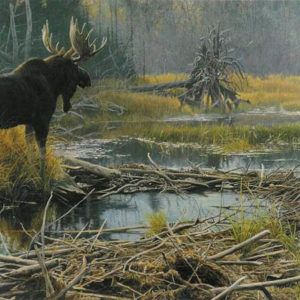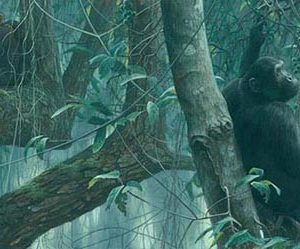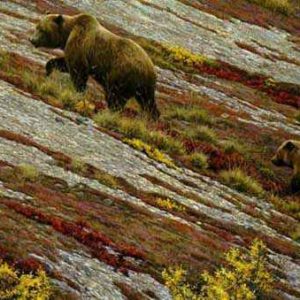Description
Return Bald Eagle Pair – 24 x 32; Canvas Edition; Edition Size 450; $495.00 U.S.
“The bald eagle is a symbol in more ways than one. The obvious one is the fact that it is the emblem of the United States of America. It is certainly a handsome bird that brings a lift to the heart and a smile to the lips, even to experienced observers. Benjamin Franklin felt, however, that the American turkey would be a better psychic symbol for the fledgling American nation.
…
The bald eagle became a very vivid symbol of the folly of the past World War II slogan to “live better though chemistry”. Since the 1940’s technological advances in chemistry have contributed greatly to humankind’s convenience and well being. However, like all technology it is a double-edged sword. Rachel Carson blew the whistle on the unintended but dreadful consequences of DDT in her landmark book Silent Spring.
I started birding in the 1940’s. At that time we had certain bald eagle nests and sites to visit. By the late 1950’s and ‘60s these disappeared due to the effects of DDT. In fact the eagle was wiped out over most of its eastern range. DDT was not much used in the forests of the Pacific coast, where eagle populations remained healthy. Peregrine falcons, brown pelicans and who knows how many other creatures suffered a similar fate from the poison.
…
Since DDT use in North America was banned in 1972 the bald eagle has become a hopeful symbol because the populations are springing back. For example, Chesapeake Bay region produced only 7 young in 1962. In 1986 the number rose to 188. This is one of the reasons for selecting the title The Return for this painting. There are, however, troubling signs for the future, once again due to human activities. This is one reason why I showed the male eagle returning to the nest without a fish. Industrial fishing is mopping up populations of herring, salmon and even less commercially interesting fish. This combined with pollution from pulp mills and other industries is having disastrous effects on marine life including seals, sea otters and killer whales.
For the time being we are still thrilling to the sight of this magnificent bird, including at this nest in my own neighborhood.” – Robert Bateman
Biography
Robert Bateman has been called the most famous living artist. He continues to paint and tour the world to promote conservation and preservation of nature. We have represented Robert Bateman for decades and are now the sole publisher and distributor of his reproductions. We are so honored to work with him and witness his success. He has made such a massive contribution to the art world and the natural world as an artist and educator of the earth’s most important resources.
Nature as a subject is becoming more and more popular as our environment is in peril. What better subject is there than the beautiful creatures we share this world with? Robert Bateman’s appreciation and understanding of nature are apparent in his paintings. He is able to paint flora and fauna the way your eye would perceive it in real life. It is important that the animal takes full attention. The background becomes muted, and therefore it doesn’t take too much focus away from the subject. His paintings seem effortless and masterful all at once.
Bateman’s eye for composition is unparalleled. Each painting is a composed like a symphony, leading the eye to wander. From the backyards of North America to the sprawling plains of Africa. Robert Bateman captures nature the way it should be enjoyed. Above all he is a champion of wildlife. For this reason he has become a household name for art collectors.




